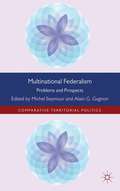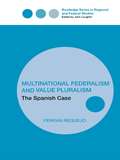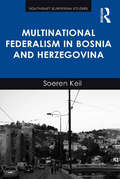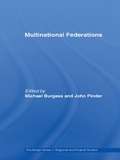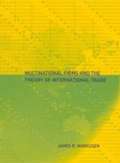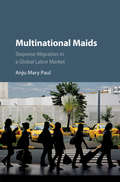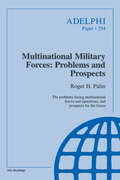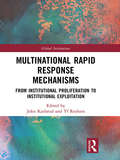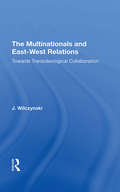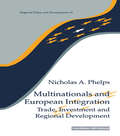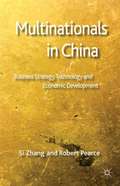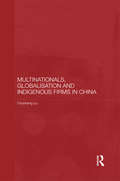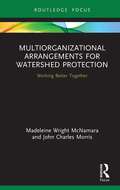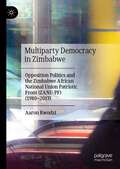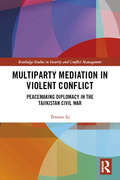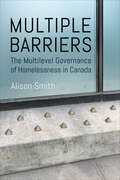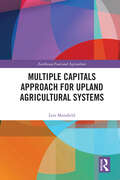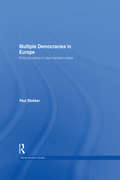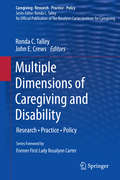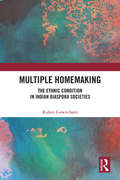- Table View
- List View
Multinational Enterprises in Latin America since the 1990s
by Pablo ToralPrivatization of state-owned enterprises and liberalization of trade and investment flows were two of the cornerstones of the structural reforms implemented by governments across Latin America in the 1990s. Spanish multinational enterprises were attracted by these reforms into industries such as banking and finance, telecommunications, public utilities, and oil and gas. By the late 1990s, Spain passed the United States as the main origin of foreign direct investment flows in Latin America. Building on the know-how developed in previous decades in Spain, Spanish multinationals became major player in these sectors that constituted the backbone of the Latin American economies.
Multinational Enterprises, International Trade, and Productivity Growth: Firm-Level Evidence from the United States
by Wolfgang Keller Stephen R. YeapleA report from the International Monetary Fund.
Multinational Federalism
by Alain-G. Gagnon Michel SeymourA collection of state of the art reflections by fourteen leading experts in the field of multinational federalism. Seymour and Gagnon have gathered contributions from philosophers, political scientists and jurists dealing with the accommodation of peoples in countries like Belgium, Canada, Europe, Great Britain, India and Spain.
Multinational Federalism and Value Pluralism: The Spanish Case (Routledge Studies in Federalism and Decentralization)
by Ferran RequejoThis book addresses the democratic accommodation of national pluralism through federal rules. The key question is: can federalism be a fair and workable way of articulating multinational societies according to revised liberal-democratic patterns? In recent years, scholarly discussion on this issue has undergone a change. Nowadays, the answer to this question is much more complex than the one that traditional political liberalism and federalism used to give us. In the past, these two political approaches usually addressed the question of political pluralism without seriously including national pluralism in the discussion, a theoretical attitude that has often misrepresented and impoverished the moral discussions and the institutional practices of multinational democratic federations. Multinational Federalism and Value Pluralism has been awarded the prize for the best book in 2005 by the Spanish Political Science Association (AECPA).
Multinational Federalism in Bosnia and Herzegovina (Southeast European Studies #1)
by Soeren KeilIn 1995 none of the political parties representing the peoples of Bosnia preferred a federal option. Yet, Bosnia became a federal state, highly decentralised and with a complex institutional architecture. This solution was imposed on them by international actors as a result of peace negotiations following the Yugoslav wars. Political parties in post-war Bosnia were not willing to identify with or accept the federation. The international community intervened taking over key decisions and so Bosnia and Herzegovina became the first state to experience a new model of federalism, namely ’imposed federalism’ and a new model of a federal state, that of the ’internationally administered federation’. By combining comparative politics, conflict analysis and international relations theory Soeren Keil offers a unique analysis of federalism in post-Dayton Bosnia and Herzegovina. By exploring this model of ’imposed federalism’ not only does this study greatly contribute to the literature on developments in Bosnia and Herzegovina it also re-evaluates comparative federalism in theory and practice. This study also offers important conclusions for similar cases, both in the Western Balkans region and the wider world, where international involvement and federalism as a method of conflict resolution in diverse societies becomes ever more prevalent and important.
Multinational Federations (Routledge Studies in Federalism and Decentralization)
by John Pinder Michael BurgessThis is the first comparative volume available on multinational federations, bringing together an international range of experts on federalism. Multinational federations are federal states intended to provide a framework that can accommodate, manage and resolve some of the most intractable political conflicts of our time that emerge from identity politics: those that stem from competing national visions, whether within or between established states. Featuring key experts in the field such as Michael Burgess, Alain Gagnon and Ronald Watts, this unique book draws on a wide geographical range of country studies including Belgium, Canada, India, Malaysia, Spain, Russia, Cyprus, India, Switzerland and the EU in order to illustrate the pivotal relationship between federalism and nationalism. In so doing, it addresses the practical relevance of federalism to the new political recognition of difference and diversity in the specific form of national minoritarianism. Multinational Federations will be of strong interest to students and researchers of federalism, democracy and nationalism.
Multinational Firms and the Theory of International Trade
by James R. MarkusenDespite the great importance of multinational firms in international economics, theoretical and empirical research on these firms has generally been conducted separately from that on international trade. In this book, James Markusen provides a comprehensive integration of the two fields. Drawing on twenty years of research, he focuses on the interaction of scale economies, trade costs, factor endowments, and imperfect competition. He analyzes decisions about whether to build or acquire a foreign plant separately from decisions about where to raise the financing. Markusen begins with the simplest possible partial equilibrium models and works systematically toward a full-fledged general equilibrium model with both horizontal and vertical foreign direct investment. He offers empirical tests of hypotheses derived from the theoretical models. The notation is unified throughout, distinctions between models are explained with thoroughly explained derivations, and numerous graphs support the analysis.
Multinational Maids: Stepwise Migration in a Global Labor Market
by Paul Anju MaryMultinational Maids offers an in-depth investigation into the international migrations of Filipino and Indonesian migrant domestic workers. The author taps on her rigorous study of more than 1,200 subjects' migration trajectories to reveal how these migrants work in a series of overseas countries to improve their lives and, in some cases, seek permanent residence in another country. Challenging the portrayal of Asian migrant domestic workers as victims of globalization, Multinational Maids reveals migrants' agency and strategic thinking under conditions of constraint. At the market level, the establishment of guestworker programmes for migrant domestic workers in multiple countries has created a global labour market. A transnational diaspora shapes migrants' evolving destination imaginaries, while manpower recruitment and placement agencies create transnational mobility structures. In addition, differing destination hierarchies and degrees of access to resources lead to the adoption of divergent stepwise trajectories. Written in an accessible manner, Multinational Maids appeals to migration scholars, policymakers, activists and students.
Multinational Military Forces: Problems and Prospects (Adelphi series #No.294)
by Roger PalinFirst Published in 2005. Routledge is an imprint of Taylor & Francis, an informa company.
Multinational Military Intervention: NATO Policy, Strategy and Burden Sharing
by Stephen J. Cimbala Peter K. ForsterWar, as Clausewitz reminds, is the most uncertain of human political and social activities. It also imposes burdens. In an alliance among states for the promotion of collective defense or security, such as the North Atlantic Treaty Organization (NATO), burdens have to be shared. This study looks at the experience of the United States and other member states of NATO in four situations of multinational military intervention - Lebanon, the Persian Gulf, the Balkans, and South Asia - and considers the implications of nuclear arms reductions and nonproliferation for the US and NATO. Each case study represents an important period in the distribution of power, interest, and values, amounting to more than a sequential consideration of incidents of military intervention and/or conflict prevention. These politico-military challenges include a major coalition war, a traditional peacekeeping operation, an exercise in peace enforcement, and a conflict that combines counter-insurgency and counter-terrorism with stability and security operations.
Multinational Rapid Response Mechanisms: From Institutional Proliferation to Institutional Exploitation (Global Institutions)
by John Karlsrud Yf ReykersThe track record of military rapid response mechanisms, troops on standby, ready to be deployed to a crisis within a short time frame by intergovernmental organizations, remains disappointing. Yet, many of the obstacles to multinational actors launching a rapid and effective military response in times of crisis are largely similar. This book is the first comprehensive and comparative contribution to explore and identify the key factors that hamper and enable the development and deployment of multinational rapid response mechanisms. Examining lessons from deployments by the AU, the EU, NATO, and the UN in the Central African Republic, Mali, Somalia and counter-piracy in the Horn of Africa, the contributors focus upon the following questions: Was there a rapid response to the crises? By whom? If not, what were the major obstacles to rapid response? Did inter-organizational competition hinder responsiveness? Or did cooperation facilitate responsiveness? Bringing together leading scholars working in this area offers a unique opportunity to analyze and develop lessons for policy-makers and for theorists of inter-organizational relations. This work will be of interest to scholars and students of peacebuilding, peacekeeping, legitimacy and international relations.
Multinationale Unternehmen aus Schwellenländern und Europa: Herausforderungen und Strategien
by Andreas Nölke Louis Brennan Johannes Jäger Andreas Breinbauer Andreas G. M. NachbagauerIn letzter Zeit hat die Öffentlichkeit Bedenken hinsichtlich der Auswirkungen multinationaler Unternehmen aus Schwellenländern geäußert. Die Expansion chinesischer multinationaler Unternehmen nach Europa und die Belt and Road Initiative ist ein prominentes Beispiel, das Hoffnung geweckt hat, aber auch das Bewusstsein für die langfristigen Auswirkungen geschärft hat. Auf der Grundlage einer systematischen Analyse von Internationalisierungstheorien, der Rolle ausländischer Direktinvestitionen und multinationaler Unternehmen in Verbindung mit eingehender empirischer Forschung anhand von Fallstudien in der Türkei, Russland, Lateinamerika, Asien und Europa befasst sich dieser aktuelle Sammelband mit den Chancen und Bedenken im Zusammenhang mit diesem neuen Trend. Darüber hinaus liefert er neue Erkenntnisse, die für Wissenschaftler, politische Entscheidungsträger, regionale Wirtschaftsagenturen und Studenten sowie für die breite Öffentlichkeit von großer Bedeutung sind. Durch die Konzentration auf die (potenziellen) Auswirkungen der Expansion multinationaler Unternehmen aus Schwellenländern auf Europa und die Einbeziehung einer langfristigen Perspektive bietet das Buch eine neue Sichtweise auf ein äußerst kontroverses Thema.
Multinationals and East-West Relations: Towards Transideological Collaboration
by J WilczynskiWHEN in the future historians examine the second half of the twentieth century, they will no doubt identify the accelerated inter-nationalization of production as a landmark comparable with the Industrial Revolution. In this process multinational enterprises have been leading actors in the past twenty-five years and are certain to continue to be so in the next quarter-century. In 1975 the sales of the Western multinational corporations represented one-fifth of the Gross National Product of all capitalist countries. If their growth is maintained at the same rate as over the period 195o-75, by the end of the century this share will be nearly one-half and the whole capitalist economy may very well be dominated by some 200 giant corporations of which three-quarters may be American-based.
Multinationals and European Integration: Trade, Investment and Regional Development (Regions and Cities)
by Nicholas A. PhelpsThis book examines the role of the multinational firms in processes of European integration. It is primarily concerned with the implications of market integration and industrial restructuring for peripheral European regions. Nicholas Phelps argues that, because of the complex relationship between competition and economies of scale, the persistence of market segmentation, and because of the embeddedness of multinational investment in established production locations, there is considerable inertia in the existing trade and investment patterns of multinationals in the EU. This argument is explored empirically in relation to multinationals operating in Wales. This study suggests that processes of restructuring accompanying market integration are slow to take effect and based on a diversity of motives.
Multinationals in China
by Robert Pearce Si ZhangMultinationals, China and the Global Economy analyses the results of an in-depth survey of subsidiaries in China of leading manufacturing multinational enterprises (MNEs). It investigates the strategic roles played by these subsidiaries and the sources of technologies they access or generate in doing this. It provides an original contribution to the understanding of important issues in international business, the economic development of China and economics. In international business this study extends our knowledge of MNEs' global strategies through detailed analysis of the precise roles they expect their subsidiaries in China to play. A central theme of this is how these roles relate to the development of the Chinese economy and help its positioning in the global economy. Using the results of their survey, the authors analyse how MNEs are operating within the reorientation of Chinese development from low-cost exporting to an innovation-oriented and knowledge-driven economy. A very distinctive response to the growing Chinese market, and its changing patterns of consumer demand, emerges as a crucial factor at the core of this.
Multinationals on Trial: Foreign Investment Matters
by Henry Veltmeyer James PetrasThe role and economic power of corporations that dominate the world economy has generated considerable controversy. The most heated debate and the most critical questions surrounding the role of multinational corporations relate to foreign direct investment (FDI). This key volume offers an entirely fresh perspective of the role of multinationals and the development impact of FDI. Contrary to prevailing opinion, it examines whether imperialism is a much more useful concept for describing and explaining the dynamics of world development than globalization. FDI is a mechanism for empire-centred capital accumulation, a powerful lever for political control and for re-ordering the world economy. This is a much needed analysis of global capitalism and its impact around the world, resulting in an excellent resource for students, academics and activists.
Multinationals, Globalisation and Indigenous Firms in China (Routledge Studies on the Chinese Economy)
by Chunhang LiuThis book considers the impact of multinational companies in China on the Chinese economy and on indigenous firms in China. It shows how the global business environment has undergone profound changes since the early 1990s, leading to an explosion of merger and acquisitions activity and consequent unprecedented degrees of concentration in many industries at a global level. It discusses the effects of these developments on the Chinese economy – both on multinationals and indigenous firms – analysing company strategies, activities and value chain structures. It shows that, as China’s integration into the global economy increases, new, globalised value chain structures are becoming the established norm across the Chinese economy. In particular, it explores the effects of these developments for local Chinese firms, where the strategy of "catch-up" has recently been a primary goal, demonstrating how difficult it is for Chinese firms to achieve "catch-up" when the competitors they are chasing are themselves moving forward and evolving so fast. The book includes detailed case studies of Boeing, Wal-Mart and Coco-Cola, considering their activities both at the global level and within China, and case studies of the sectors in which these forms operate in China. The book’s profoundly important conclusions concerning the impact of multinationals on the local economy and on indigenous firms are applicable to other developing economies as well as to China.
Multiorganizational Arrangements for Watershed Protection: Working Better Together (Routledge Research in Public Administration and Public Policy)
by Madeleine Wright McNamara John Charles MorrisWith cross-pollination of the public administration and policy implementation literatures, Madeleine Wright McNamara and John Charles Morris present the Multiorganizational Interaction Model as a framework to explore the use of cooperation, coordination, and collaboration between 15 federal/state agencies, local governments, and nongovernmental organizations working together to restore coastal habitats and replenish aquatic resources on Virginia’s Eastern Shore. Content analysis of data collected through interviews and organizational documents allows comparisons to be made regarding the distribution of data across the continuum of interaction. The presence of policy mandates intending to prescribe relationships coupled with strong perceptions of collaboration, create opportunity to explore mandated and voluntary collaboration. Themes regarding mapping relationships within the multiorganizational arrangement, movement on the continuum, and implementation through mid-level personnel are discussed. The combination of theory development and testing provides readers with a theoretical framework through which to think about interorganizational interactions, and a case study to illustrate the ways in which these complex relationships manifest themselves in practice. Multiorganizational Arrangements for Watershed Protection will be essential for scholars, students, and policy makers.
Multiparty Democracy in Zimbabwe: Opposition Politics and the Zimbabwe African National Union Patriotic Front (ZANU-PF) (1980–2017)
by Aaron RwodziThis book provides a comprehensive account of the tumultuous political landscape of Zimbabwe. Delving into historical and contemporary perspectives, the author analyses the relationship between the ruling ZANU-PF party and the opposition, exposing the pervasive influence of foreign powers and their ‘regime change’ agendas. Amidst western-imposed economic sanctions, the book examines how political opposition has struggled to maintain its footing in the face of ZANU-PF's rhetoric on preserving the nation's sovereignty. Drawing on the powerful theoretical frameworks of Gramsci's hegemony theory and instrumentalism, the book dissects the constraints on multiparty democracy under ZANU-PF's rule. From the party's manipulation of liberation narratives to the subtle intricacies of ‘Mugabeism’, a violent and ideological stronghold, the author unveils the tactics employed to maintain power. The chapters uncover the pivotal role played by the military throughout Zimbabwe's history: from the days of the liberation struggle to the shocking events of 2017, when Mugabe's grip on power was diminished by the very force that had propped him up for decades, the author reveals how the military's involvement has thwarted opposition players' attempts to claim power. Boldly challenging the notion that constraints solely rest on ZANU-PF, this book calls attention to the shortcomings of opposition parties in navigating Zimbabwe’s treacherous political landscape. Using compelling evidence and unparalleled analysis, the book is an essential read for those seeking to understand the intricate web of power, manipulation, and struggle that has defined Zimbabwe's political journey.
Multiparty Mediation in Violent Conflict: Peacemaking Diplomacy in the Tajikistan Civil War (Routledge Studies in Security and Conflict Management)
by Tetsuro IjiThis book presents a conceptual and empirical analysis of the UN-led multiparty mediation in the Tajikistan conflict. Multiparty mediation has been a significant research topic of international conflict management since the 1990s, but in-depth case studies on the peacemaking dynamics of violent conflicts are rare, particularly in regard to third-party roles. This volume addresses that gap in the literature by examining the multiparty mediation of the Tajikistan conflict, a largely forgotten but notably successful case of UN-orchestrated peacemaking in the post-Cold War era. It argues that several interrelated factors contributed to the "success" of the Tajik multiparty mediation: Russia, Iran, and other major interveners shared a common interest, and reached a broad consensus on the terms of settlement; the UN was widely accepted as a lead coordinator by other mediators, and succeeded in constructively engaging with them; as a consequence, there arose positive interconnections between different third-party roles. The book presents an analytical framework for understanding the complex interplay of these factors, not only to evaluate the Tajik case but also to help clarify policy implications for multiparty mediation in other cases of violent conflict, particularly civil wars. This book will be of much interest to students of conflict resolution, civil wars, international mediation, the UN, Central Asian politics, and International Relations.
Multiple Barriers: The Multilevel Governance of Homelessness in Canada (Studies in Comparative Political Economy and Public Policy)
by Alison SmithDespite decades of efforts to combat homelessness, many people continue to experience it in Canada’s major cities. There are a number of barriers that prevent effective responses to homelessness, including a lack of agreement on the fundamental question: what is homelessness? In Multiple Barriers, Alison Smith explores the forces that shape intergovernmental and multilevel governance dynamics to help better understand why, despite the best efforts of community and advocacy groups, homelessness remains as persistent as ever. Drawing on nearly 100 interviews with key actors in Vancouver, Calgary, Toronto, and Montreal, as well as extensive participant observation, Smith argues that institutional differences across cities interact with ideas regarding homelessness to contribute to very different models of governance. Multiple Barriers shows that the genuine involvement of locally based service providers, with the development of policy, are necessary for an effective, equitable, and enduring solution to the homelessness crisis in Canada.
Multiple Capitals Approach for Upland Agricultural Systems (Earthscan Food and Agriculture)
by Lois MansfieldThis book focuses on upland agricultural systems and applies a multiple capitals approach to explain what they can provide at a time when many are struggling to survive.Marginal upland agricultural systems have been distorted and derailed by modern economics, politics, and the drive to intensification. This book argues for the application of a multiple capitals approach to resource management challenges for marginal upland agricultural communities. Instead of considering what upland agricultural systems lack, the book showcases how a multiple capitals framework can demonstrate the importance, interrelationships, and relevance of the suite of capitals (natural, human, social, cultural, and financial) to achieve better outcomes for upland communities, broader ecosystem services, and wider society more generally. It is designed to connect theory to practice to provide underpinning knowledge and guidance to help upland agricultural communities thrive. Drawing on case studies from the UK and Japan, as well as making comparisons with Central and South American countries, the book recommends tools for monitoring different forms of capital and suggests a management process driven by multiple capitals to create resilience in upland agricultural systems.This book will be of great interest to students and scholars of agriculture, natural resource management, ecosystem services, rural development, and those interested in applying a multiple capitals approach more widely within policy and landscape management contexts.
Multiple Democracies in Europe: Political Culture in New Member States (Democratization Studies)
by Paul BlokkerThis book provides an in-depth discussion and analysis of democracy in Europe, with a focus on the new EU member states, and makes an important and original contribution to the debate on the future of European democracy. Author Paul Blokker seeks to provide a critical reconceptualization of the notion of democratic political culture by developing a 'multiple democracies' theoretical approach. He draws on debates in democratization theory and normative political theory, and presents a cultural-sociological approach for the analysis of democratization and democratic regimes. This approach emphasizes the historical and cultural embedment of democracy, identifies a potential variety of 'ethics of democracy' that underpin democratic political cultures, and points to the significance of democratic imagination in the interpretation and recombination of such ethics. The book explores the relevance of this approach by analysing multiple political cultures and their role in the emergence of democratic regimes in three new member states - Hungary, Poland, and Romania - providing a detailed description and analysis of political cultures by means of the analysis of constitutional politics, constitutional texts, and political elite discourses, and the identification of distinct politico-cultural elements that distinguish these societies from each other. It will be of interest to students and scholars of democracy, European studies, post-communist studies, political theory and comparative politics.
Multiple Dimensions of Caregiving and Disability
by John E. Crews Ronda C. TalleyCaring for people with disabilities often becomes an all-encompassing responsibility for one or more family members. To manage the multifaceted demands, caregivers must possess strong multitasking skills, including the ability to assist with daily life tasks; provide emotional support; help with financial affairs; mediate and advocate with health care providers. Maintaining balance within their own lives can become incredibly challenging for caregivers. More often than not, providing care for family members or loved ones occurs at the expense of the caregivers' well-being. And for caregivers who themselves have disabilities, it further complicates matters. Multiple Dimensions of Caregiving and Disability addresses concerns that have been long familiar to the caregiver population and examines the current state of family care for individuals with disabilities. With a lifespan perspective, this concise reference reviews the literature on specific problems of caregivers and explores which care strategies are effective, promising, or lacking in available resources and support interventions. Contributors also explore the more fluid and subjective aspects of caregiving, such as feelings, spirituality, and family roles. Suggestions for future policy improvements, particularly within the public health sector, are discussed as well. Topics covered include: * Family dynamics and caregiving for people with disabilities. * Parent caregiving of children with disabilities. * Race, ethnicity, socioeconomic status, and caregiving. * Educational, training, and support programs for caregivers. * Emerging technologies to aid caregivers. * Developing partnerships between caregivers and health care providers. Multiple Dimensions of Caregiving and Disability is a must-have resource for researchers, scientist-practitioners, policy makers, and graduate students across such disciplines as clinical psychology, nursing, social work, public health, medicine, and social and education policy.
Multiple Homemaking: The Ethnic Condition in Indian Diaspora Societies
by Ruben GowricharnThis book develops a theoretical perspective on homemaking as the ethnic condition of Indian diaspora communities. It draws on empirical case studies to elucidate the multiple homemaking practices of two overseas Indian groups and their relations to their homeland, namely the Surinami Hindustanis and the Dutch Hindustanis. In doing so, it provides a new perspective on homemaking that captures ethnogenesis, integration and diasporic bonding at once. As opposed to the extant discourse on homemaking which overlooks institutional and cultural requirements, the author makes a point to scrutinise such concepts as douglarisation, groupism, citizenship, institutions, ethnification, social networks and technology, and transnational flows. Unique and compelling, the book will be highly useful in studies of diaspora, globalisation and transnational migration, multiculturalism, cultural studies, ethnic minority studies, sociology, politics and international relations, and South Asian studies.

